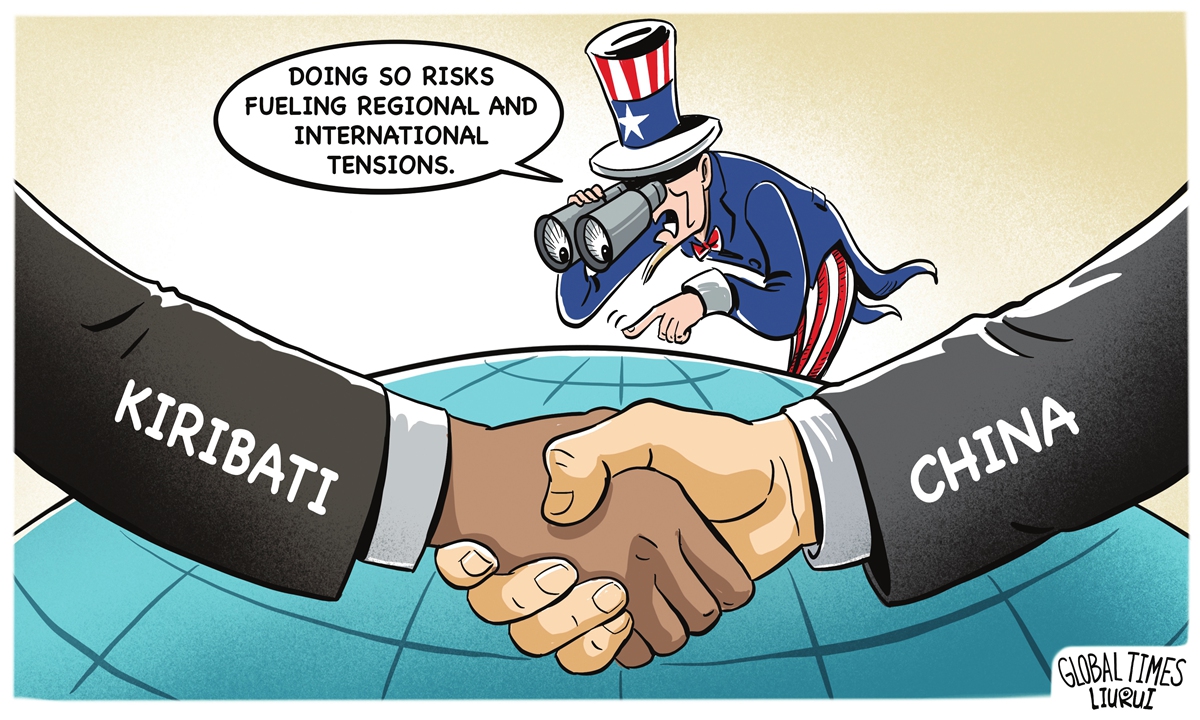
Inciting tensions. Illustration: Liu Rui/GT
In light of the Chinese police cooperating with Kiribati, the US once again turned its attention to this Pacific Island nation, and cautioned countries in the region against assistance from Chinese security forces, according to a Reuters report on Monday.
Although Kiribati's acting police commissioner clarified that the Chinese police only provides services that the Kiribati police "needs or requests," a US State Department spokesperson expressed concerns about the "potential implications" that security agreements and security with China may have on a nation's sovereignty. In reality, this statement is an outright slander. It is evident that there are no negative implications associated with the China-Kiribati cooperation, and the US is well aware of this fact.
China's cooperation with Kiribati is in response to the island nation's requests to enhance its policing capacity for the sake of social stability and public well-being based on mutual respect and equality. This joint move doesn't attach any political conditions and has been welcomed by the Kiribati government and people. However, since the US has always attached great importance to its military presence in the Pacific as a strategy priority, it follows a brigandish logic to smear and defame China's cooperation with Kiribati as related to "militarization."
The US cautioning Kiribati even goes beyond long-arm jurisdiction - it is almost an act of blatant disregard or even contempt for the sovereignty of an independent country, and a callous interference in Kiribati's internal affairs. The unspoken words are that Kiribati has the right to be autonomous but lacks the capacity to do so.
When it comes to China's proactive support for and assistance to social and economic development in Pacific Island countries, it is smeared and vilified as "neo-colonialism" and a "threat." The fact is that, in the name of police cooperation, the US has been persistently pushing for a completely unequal security cooperation and militarized deployment, seeking justifications for its hegemony, sidelining and even ostracizing China's presence in the Pacific. Such "double standard" behaviors expose the US' hegemonic ambitions and ulterior motives in the region, while revealing its attempts to alienate the relationship between China and the Pacific Island nations by hyping up the fabricated "China threat theory."
In recent years, the Chinese government has increasingly become the preferred partner of Pacific Island countries for public security. In July of last year, the Solomon Islands government said its policing pact with China not only posed no "threat" to the Pacific region, but positively contributed to the stability and development there, dismissing calumnies of Western powers that the deal could "intensify regional tensions." In January, Papua New Guinea also requested Chinese police assistance after 15 deaths in violent riots in the country.
The growing and deepening cooperation between China and Pacific Island nations is due to the rather limited capacity of the police force there. This is actually a lingering legacy of Western colonization in history, when the colonizers governed the region with the implantation and imposition of the Western system of governance. When the island countries ultimately achieved their independence, there was a virtual void in terms of social governance, causing consistent problems and social issues with the local police unable to handle situations like social unrest effectively. Therefore, the cooperation with China precisely makes up for this deficiency. China's help, based on mutual respect and mutual benefits, has been enormously successful, with widespread welcome and support.
The more the West attacks China, the more it proves China's contribution has been successful, making itself the target of envy and malice. Had China not been a trusted and appreciated partner in the Pacific region, the anti-China elements in the West would not have taken such pains to blaspheme the fruitful and prosperous collaboration between China and the Pacific Island countries such as Kiribati. Despite the constant vilification from the West, these Pacific countries have been sticking to the partnership with China - it is self-evident what is right and what is wrong.
In fact, the increasingly warming relations between the Pacific Island nations and China are not the outcome of China's "influence," but rather a choice made by these countries themselves. Last year, the US planned to provide more than $7 billion assistance to three Pacific Island countries. Earlier this month, the US failed to include the funding in the aid package. The US' empty promise shows that what Washington really cares about is not the economy and security of the Pacific Island nations, but their geopolitical values to its regional and global hegemonic strategy.
The countries in the Pacific are discerning enough to distinguish between those who have vested interests in them and those who cooperate with them based on mutual benefits and respect. Despite US efforts to discredit China and alienate it from the Pacific Island countries, such malicious attempts are bound to fail. The governments and peoples in the Pacific have the political wisdom and judgment to make the right choices.
This is not the first time that the US has failed to deliver on its promises, nor will it be the last. Rather than relying on supposed "assistance" from the US, countries and peoples in the region need to proactively safeguard their sovereignty and advance national development for their long-term interests. The US has historically viewed island countries as pawns in its strategic games, but the current global trend clearly indicates the right side of history.
The author is the executive director of the Asia Pacific Studies Center at East China Normal University. opinion@globaltimes.com.cn

